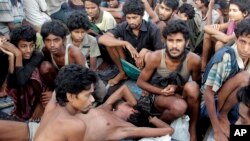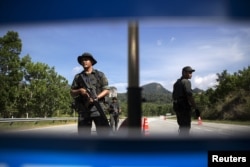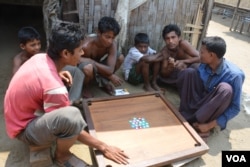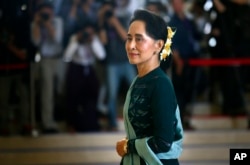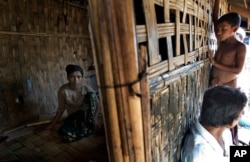Myanmar government officials, lawmakers and rights activists say the country should step up efforts to combat human trafficking following the United States’ recent decision to list Myanmar among the world’s worst countries for trafficking and forced labor.
It remains unclear, however, how the new democratic government can address the problems since Myanmar’s powerful military continues to control the law enforcement authorities, while its commanders are allegedly responsible for specific trafficking violations such as recruiting child soldiers.
Some also questioned whether Myanmar’s downgrade to Tier 3 in the State Department’s Trafficking in Persons report earlier this month was entirely justified.
“The U.S. needs to understand that the situation did not go down and we are still complaint with conditions of the Tier 2 Watch List,” Zaw Htay, a spokesperson for the National League for Democracy (NLD) government, told VOA.
He argued that Myanmar was downgraded because it simply could not stay beyond the maximum of four years on the Tier 2 Watch List.
“Our anti-human trafficking projects will be accelerated in the coming years. We are studying the report’s recommendations. So we are confident that we will be taken off the Tier 3 list,” he said. He sidestepped questions on whether the government would encourage the military to combat trafficking more actively.
The U.S. placed Myanmar on Tier 3, meaning it did not meet the “minimum standards” to reduce trafficking and is “not making significant efforts to do so.” The move could lead to limitations on U.S. aid to the country.
The downgrade is based on last year’s performance by the previous, army-backed civilian government, but it comes during the first months of the NLD government and puts pressure on both the new government and the military.
NLD willing, but constrained
The report said the army uses civilians for forced labor in ethnic conflict areas and continues to recruit child soldiers, though a UN-backed program is reducing the latter practice.
Myanmar authorities failed to actively combat domestic labor trafficking of men, women and children, and cross-border labor and sex trafficking to Thailand and China, the report said.
The government’s mistreatment of stateless Rohingya Muslims in Rakhine State caused thousands to leave for Thailand or Malaysia on the boats of people smugglers, where they become vulnerable to trafficking, it noted.
Win Myint Aung, a NLD secretary of the Lower House Committee for Democracy and Human Rights, acknowledged trafficking was widespread and said its root causes - poverty, instability and corruption - resulted from decades of military rule.
“However, this issue is not as bad as portrayed by the United States, we can still manage this situation. We all need to try to leave Tier 3 status,” he said. “The government must conduct public education programs on trafficking and it’s crucial that different government agencies cooperate on this issue. The previous governments were not effective in these aspects.”
But he added the government would not pressure the military on its internal issues such as child soldiers.
Firmer police action
Khin Maung Myint, a NLD Upper House MP from Kachin State, said his party wants firmer police action to combat cross-bordering trafficking of poor women from northern Myanmar for marriage to Chinese farmers.
“But police and the army control law enforcement matters — it’s very difficult to deal with this issue. We are trying to negotiate with the Home Affairs Minister [Lt-Gen. Kyaw Swe],” he said.
The NLD government and its de facto leader, State Councillor Aung San Suu Kyi, face heavy international criticism for failing to improve the plight of the Rohingya and ease Rakhine’s Buddhist-Muslim tensions.
Contacted NLD members were reluctant to discuss the sensitive issue and whether the downgrade was linked to the trafficking of fleeing Rohingya.
Downgrade a signal to who?
Human rights activists said it was not entirely clear if Myanmar’s Tier 3 ranking was related to a worsening of a specific type of trafficking, or whom exactly should act on it.
“It's actually unclear who the U.S. Government is attempting to target, they haven't articulated very well why they did this,” said David Mathieson, Myanmar researcher with Human Rights Watch.
He added that the military had made significant progress in reducing child soldiering and forced labor, so these issues “can hardly be the trigger for the downgrade.”
The NLD government would struggle to respond, he said, as “the military appoints the three key Ministers of Defense, Home Affairs and Border Affairs — all crucial to trafficking issues — and [the president] has no practical daily oversight or command and control.”
Some said the downgrade could put more pressure on the NLD to improve the Rohingya’s situation.
“Addressing drivers behind irregular migration is the most efficient way to prevent people from leaving in the first place and from being trafficked,” said Chris Lewa, director of the Arakan Project, a Rohingya rights NGO.
She noted that while people smuggling halted this year because Thailand, Malaysia and Myanmar cracked down on the boats, tensions in Rakhine have recently worsened under the NLD.
Andy Hall, an advisor to the Migrants Workers Rights Network, which advocates for rights of millions of Myanmar workers in Thailand, said Myanmar’s Border Affairs authorities and Ministry of Foreign Affairs failed to help migrants obtain documentation necessary for working abroad and reduce their vulnerability to trafficking.
These problems should be addressed if Myanmar wants to improve its trafficking record. “The policies of the Myanmar government have not contributed to safe migration at all - if anything they were complicit,” he said.
Hall said the NLD government was very willing to change these policies, but added, “We see huge challenges: the military controls the Home Affairs Ministry and holds veto power over many migration issues.”




